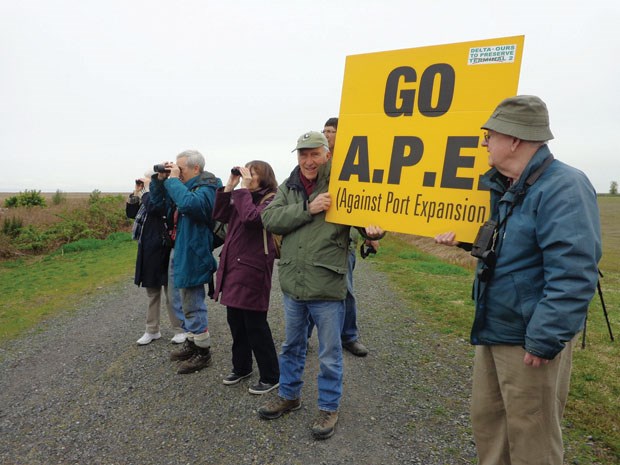Local activists are continuing to line up to take shots at Port Metro Vancouver's environmental assessment of its proposed Terminal 2 at Roberts Bank.
Earlier this year, the port authority submitted an environmental impact statement to the Canadian Environmental Assessment Agency, which will trigger a lengthy review process. The agency subsequently told the port authority to supply additional information before the review could proceed, which the port submitted in late October.
As the application slowly winds its way at the federal level, longtime local environmental activist Susan Jones has joined others in calling on the province to undertake its own environmental assessment of T2 on issues she says the port has not adequately addressed.
In a recent letter to the province, Delta council and others, including Prime Minister Justin Trudeau, Jones, who has worked with such groups as the Boundary Bay Conservation Committee, the Western Canada Wilderness Committee and the Delta Farmland and Wildlife Trust, stated, "Not only does the B.C Government not recognize the international significance of the Fraser River Estuary to millions of migratory birds, salmon and endangered whales, it fails to offer any provincial accountability to this environmental impact assessment."
She said the province needs to step up and take action because the port authority is refusing to address issues beyond its immediate footprint.
Against Port Expansion also says it has serious concerns, preparing a report of its own in response titled Port Metro Vancouver's Roberts Bank Container Terminal 2 Is Not Sustainable - It Must Never Be Built.
"We have serious questions as to why Port Metro Vancouver would want to build in what is recognized as one of the most important ecosystems in the whole of Canada," stated APE's Roger Emsley.
Similar complaints were recently put forward by Delta South MLA Vicki Huntington, who criticized B.C. Environment Minister Mary Polak for a "handsoff approach" to the environmental assessment of T2. Polak responded the province had participated in the screening of the impact statement with the feds. She also noted it won't be the last word when it comes to information that will be required during the assessment and that the province has the ability to ask for additional information. This summer, the Corporation of Delta also conveyed concerns about the completeness of the port's assessment, requesting the scope be expanded to include road and rail impacts.
On the port authority's website, Cliff Stewart, vice-president of infrastructure, noted, "After four years of scientific research (documented in a 7,000-page environmental impact statement), we have concluded the effects of the project, following the implementation of mitigation, are not expected to significantly affect the environment. It's now up to the Canadian Environmental Assessment Agency, through an independent review panel, to evaluate our studies and make a recommendation to the federal minister of environment."
He said the public will have opportunities to comment as the review moves forward over the next two to three years.
To streamline the process and avoid duplication, the provincial government is relying principally on the federal review panel environmental assessment for the information needed for its own assessment.



